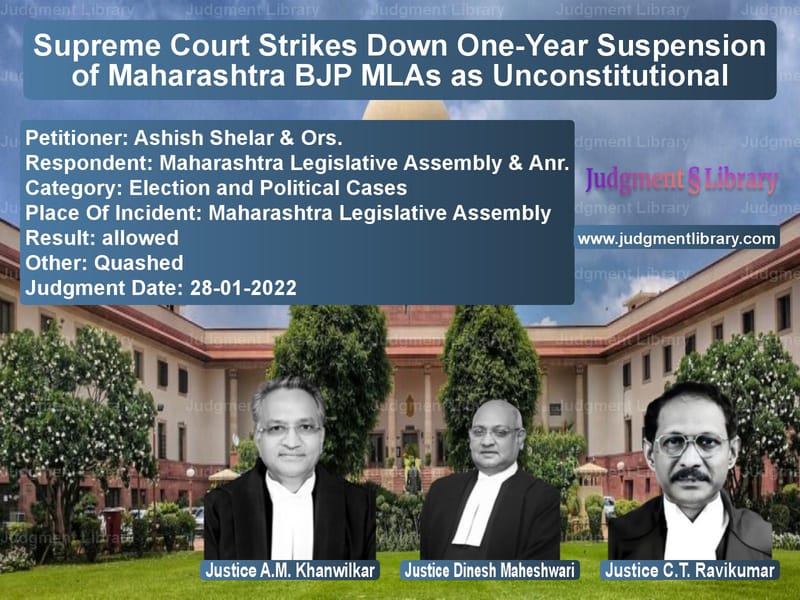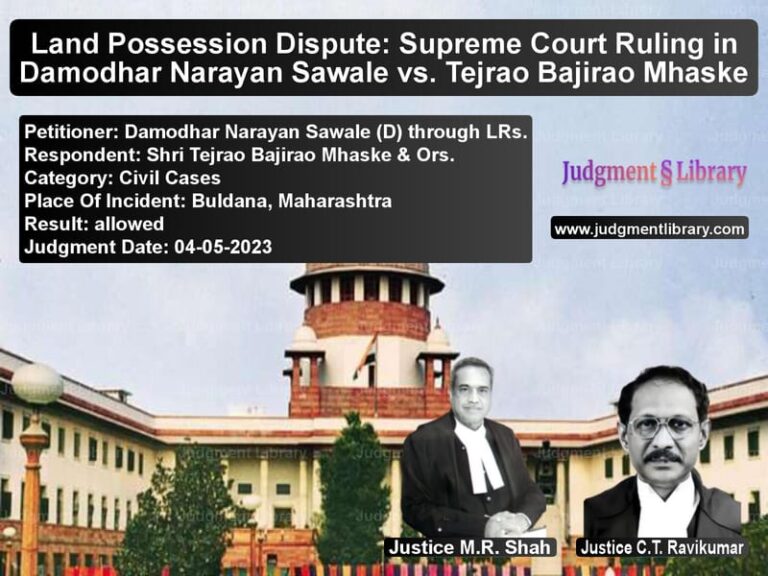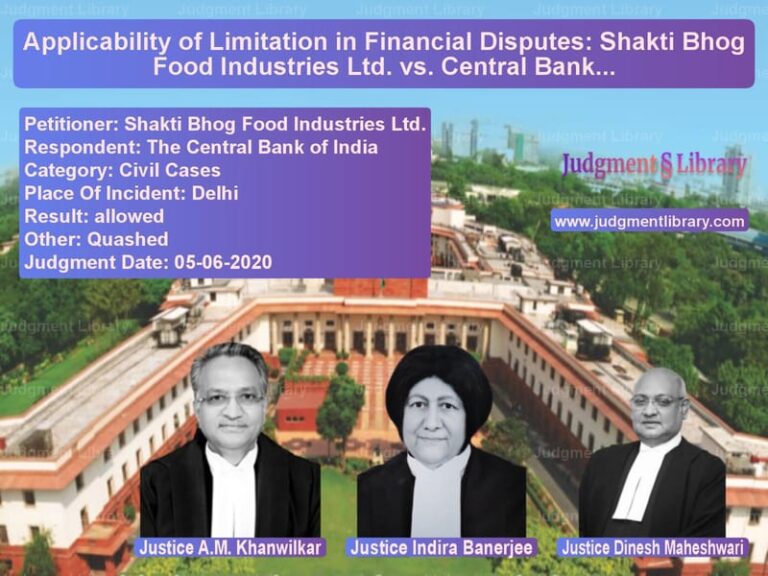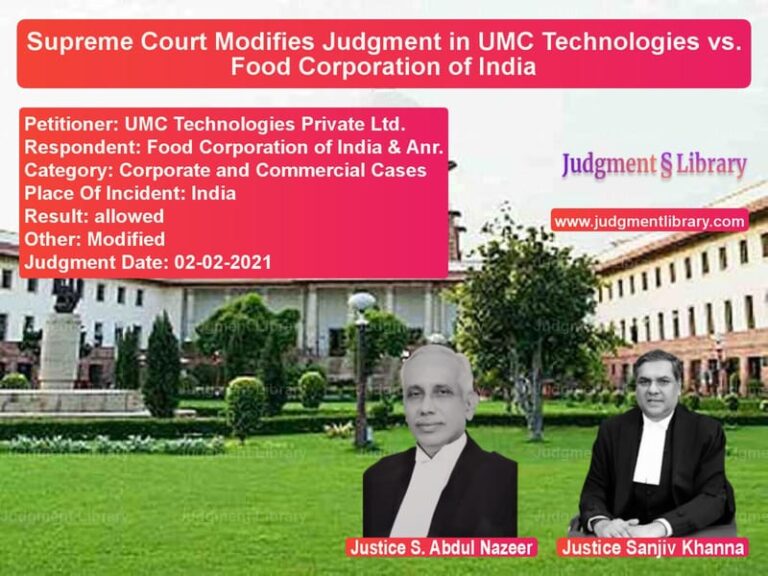Supreme Court Strikes Down One-Year Suspension of Maharashtra BJP MLAs as Unconstitutional
The Supreme Court, in a significant ruling, quashed the one-year suspension of 12 BJP MLAs from the Maharashtra Legislative Assembly, calling it ‘unconstitutional, grossly illegal, and irrational.’ This decision reaffirms the principles of democracy and legislative privileges while setting a precedent on the permissible extent of suspension of legislators.
The case revolves around 12 BJP MLAs who were suspended for alleged unruly behavior during the Maharashtra Legislative Assembly’s monsoon session on July 5, 2021. The ruling coalition of the Shiv Sena, the Nationalist Congress Party (NCP), and the Indian National Congress (INC) passed a resolution suspending these MLAs for one year. The petitioners challenged this decision in the Supreme Court, arguing that such prolonged suspension was unconstitutional and violated their fundamental rights.
Background of the Case
During the Assembly session on July 5, 2021, heated exchanges took place between the opposition BJP members and the ruling party legislators. The BJP MLAs alleged that the business of the House was being conducted in a manner that suppressed the voice of the Opposition. They claimed that the Leader of Opposition was denied an opportunity to speak on an important motion regarding empirical data on Other Backward Classes (OBCs). This led to a confrontation between the opposition and ruling party members, culminating in the adjournment of the House.
Later, when some BJP members met the Deputy Speaker to express their grievances regarding the conduct of proceedings, members of the ruling party also arrived, leading to further altercations. Subsequently, the Minister for Parliamentary Affairs moved a motion for the suspension of 12 BJP MLAs for ‘objectionable behavior and contempt of the House.’ This motion was passed by a majority vote, suspending them for a period of one year.
Arguments of the Petitioners
The suspended MLAs challenged the resolution in the Supreme Court under Article 32 of the Constitution, arguing that their suspension was unconstitutional, arbitrary, and disproportionate. Their key arguments were:
- Violation of Natural Justice: The suspension was passed without affording the MLAs an opportunity to be heard or present their defense.
- Undue Haste: The resolution was passed in a matter of hours without any formal inquiry or evidence substantiating the charges.
- Excessive Punishment: Rule 53 of the Maharashtra Legislative Assembly Rules allows suspension only for the remainder of a session, whereas the impugned resolution imposed a one-year suspension.
- Disproportionate Impact: The suspension deprived the constituencies represented by these MLAs of legislative representation, affecting democratic rights.
- Political Motive: The resolution was allegedly designed to weaken the Opposition by reducing its strength in the Assembly.
Arguments of the Respondents
The Maharashtra government defended the resolution, arguing:
- Legislative Privilege: The Assembly has inherent powers to regulate its proceedings and discipline its members.
- Judicial Review Barred: Article 212 of the Constitution bars courts from questioning the validity of legislative proceedings on procedural grounds.
- Misconduct of MLAs: The MLAs’ behavior was disruptive and warranted strict disciplinary action.
- Non-Justiciability: The decision to suspend legislators was within the prerogative of the House and beyond judicial scrutiny.
Supreme Court’s Observations
The Supreme Court, led by Justices A.M. Khanwilkar, Dinesh Maheshwari, and C.T. Ravikumar, made the following key observations:
- Legislative Privileges Are Not Absolute: While legislative bodies have the authority to regulate their proceedings, this power is subject to constitutional provisions, including fundamental rights.
- Violation of Article 14 and 21: The one-year suspension was excessive and violated the right to equality and due process.
- Suspension Cannot Exceed Session Duration: Rule 53 of the Maharashtra Legislative Assembly Rules allows suspension only for the remainder of the session. The House exceeded its jurisdiction by suspending the MLAs for one year.
- Unconstitutional and Grossly Illegal: The resolution was passed in undue haste without following due process, making it unconstitutional.
- Suspension Worse Than Expulsion: Unlike expulsion, which triggers a by-election within six months, suspension for one year left constituencies unrepresented without the possibility of re-election.
- Judicial Review Permissible: While courts cannot interfere in procedural matters, they can strike down legislative actions that are unconstitutional or violate fundamental rights.
Final Judgment
The Supreme Court quashed the resolution suspending the MLAs for one year and declared it null and void. The judgment stated:
“The impugned resolution directing suspension of the petitioners beyond the period of the remainder of the concerned Monsoon Session held in July 2021 is non est in the eyes of law, nullity, unconstitutional, substantively illegal, and irrational.”
The court held that the petitioners were entitled to all consequential benefits of being members of the Maharashtra Legislative Assembly from the expiry of the remainder of the session in July 2021.
Significance of the Judgment
This ruling has far-reaching implications for legislative proceedings and parliamentary democracy:
- Reaffirmation of Judicial Oversight: The judgment reinforces that legislative privileges are subject to constitutional scrutiny.
- Protection Against Arbitrary Suspension: It sets a precedent limiting the power of Assemblies to suspend members beyond the session duration.
- Ensuring Representation: The ruling ensures that constituencies are not left unrepresented due to excessive suspensions.
- Checks on Majoritarianism: It prevents ruling parties from using suspension as a tool to suppress opposition voices.
The Supreme Court’s verdict serves as a reminder that legislative actions must adhere to constitutional principles and due process. It upholds the integrity of democratic institutions and safeguards the rights of elected representatives and their constituencies.
Petitioner Name: Ashish Shelar & Ors..Respondent Name: Maharashtra Legislative Assembly & Anr..Judgment By: Justice A.M. Khanwilkar, Justice Dinesh Maheshwari, Justice C.T. Ravikumar.Place Of Incident: Maharashtra Legislative Assembly.Judgment Date: 28-01-2022.
Don’t miss out on the full details! Download the complete judgment in PDF format below and gain valuable insights instantly!
Download Judgment: ashish-shelar-&-ors.-vs-maharashtra-legislat-supreme-court-of-india-judgment-dated-28-01-2022.pdf
Directly Download Judgment: Directly download this Judgment
See all petitions in Legislative Powers
See all petitions in Fundamental Rights
See all petitions in Public Interest Litigation
See all petitions in Judgment by A M Khanwilkar
See all petitions in Judgment by Dinesh Maheshwari
See all petitions in Judgment by C.T. Ravikumar
See all petitions in allowed
See all petitions in Quashed
See all petitions in supreme court of India judgments January 2022
See all petitions in 2022 judgments
See all posts in Election and Political Cases Category
See all allowed petitions in Election and Political Cases Category
See all Dismissed petitions in Election and Political Cases Category
See all partially allowed petitions in Election and Political Cases Category







